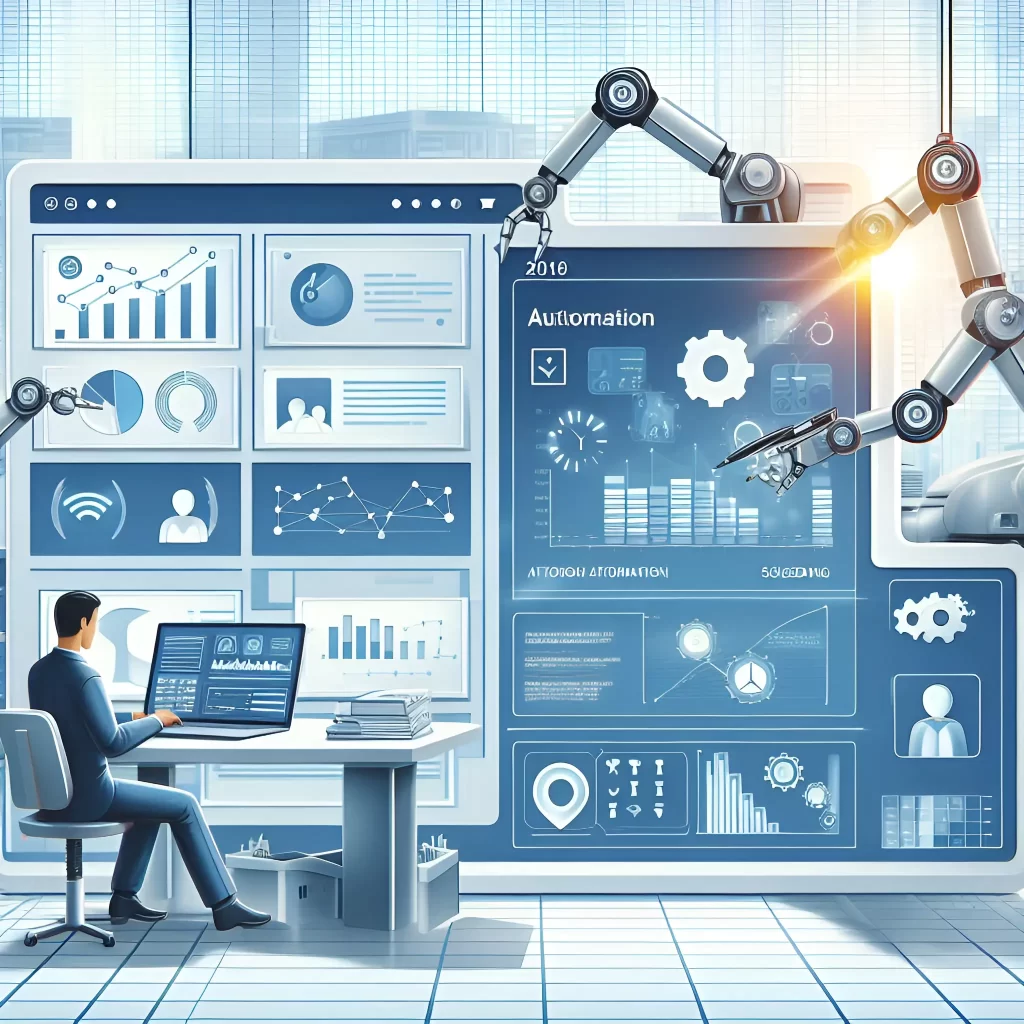
Key Takeaways
- The future of AI automation in small businesses is a transformative force boosting efficiency and competitiveness by 2025.
- Exciting AI trends in workflow automation will optimize customer interactions, predictive analytics, scheduling, and marketing.
- Emerging automation tools in 2025 like AI chatbots, analytics platforms, and marketing automation software become more accessible and powerful.
- AI reshapes business operations by enabling data-driven decisions, 24/7 engagement, scalability, shifting employee roles, and emphasizing data ethics.
- Success with AI requires assessing needs, choosing scalable tools, investing in employee training, overcoming integration challenges, and committing to continuous learning.
Understanding AI Automation in Small Businesses
AI automation means using artificial intelligence technologies to perform tasks and workflows without human intervention. This is not about replacing people but enhancing capabilities and freeing up time from repetitive processes.
AI will automate repetitive tasks, allowing employees to focus on creative problem-solving, strategic planning, and building deeper customer relationships, enhancing job satisfaction and human contribution.
In small business operations today, AI automation plays multiple roles:
- Customer Service: AI-powered chatbots provide 24/7 support, answering inquiries instantly.
- Marketing: Automating personalized campaigns based on customer behavior.
- Data Analysis: AI tools analyze customer and sales data to inform smarter business decisions.
- Scheduling: Automatically setting appointments and reminders based on user preferences.
- Payment Processing: Streamlining billing and payment workflows to reduce errors.
Common applications include:
- Chatbots that handle customer queries anytime, improving availability
- Automated booking systems that reduce admin time
- AI-driven personalized email marketing tailored to each customer
- Real-time analytics dashboards guiding stock management and marketing strategies
These AI uses have delivered clear benefits for small businesses so far:
- Increased operational efficiency by automating repetitive tasks
- Significant cost savings from reduced manual labor
- Enhanced customer engagement through personalized interactions
- Ability to scale services without hiring large additional staff
Together, these advantages help firms compete more effectively and grow steadily even with limited resources.
Learn more on how AI is reshaping daily business functions from Idea Financial’s insights, CMIT Solutions, and best AI chatbot software for small businesses at AI For All Hub.
AI Trends in Workflow Automation
The future of AI automation in small businesses is being driven forward by exciting AI trends in workflow automation that make day-to-day processes smarter and faster. By 2025, small businesses will see these key trends improving operational efficiency and reducing costs.
Advanced AI-Powered Customer Interactions
Rather than simple scripted chatbots, AI virtual assistants now handle complex conversations. They can:
- Process transactions
- Manage returns and refunds
- Qualify sales leads autonomously
This shift increases customer service availability around the clock, delivers consistent experiences, and reduces staffing needs.
Predictive Analytics and Data-Driven Decision Making
AI analyzes mountains of business data to reveal patterns and provide actionable insights. Small businesses use these tools to:
- Optimize marketing channels
- Manage inventory levels precisely
- Make smarter financial and operational plans
Predictive analytics helps owners anticipate customer needs and reduce waste.
Smart Scheduling and Task Management
AI scheduling tools learn from behavior patterns and team workflows to:
- Optimize appointment timing
- Allocate tasks efficiently among employees
- Reduce no-shows and idle time
Automation of task management boosts productivity without micromanagement.
Hyper-Personalization in Marketing
Using real-time customer data, AI delivers marketing messages tailored exactly to individual preferences and behaviors. This results in more relevant promotions and higher conversion rates.
These workflow automation trends collectively allow small businesses to do more with fewer resources, cutting operational costs while boosting service quality.
Explore in detail at Salesmate, Idea Financial, Behind The Design Co, and for broader workflow automation software options see AI For All Hub.
Emerging Automation Tools in 2025
The year 2025 will introduce and expand access to several emerging automation tools designed specifically to meet small business requirements. These tools promise to democratize AI benefits without demanding huge budgets or technical expertise.
AI Chatbots and Virtual Assistants
Next-generation AI conversational agents can:
- Handle customer inquiries end-to-end
- Process payments automatically
- Schedule follow-up appointments without human help
These capabilities increase efficiency and improve customer satisfaction by providing fast, accurate responses and seamless service.
AI Analytics Platforms
Affordable AI-driven analytics tools offer real-time insights previously only available to big enterprises. They help small businesses:
- Monitor marketing performance
- Track inventory levels
- Predict sales trends
This empowers business owners with data to make timely, informed decisions.
Marketing Automation Tools with AI Capabilities
AI-powered marketing platforms now include:
- Send-time optimization to hit customers at ideal moments
- Dynamic content generation based on user behavior
- Behavior-targeted campaigns for hyper-personalization
These features increase engagement and maximize marketing ROI.
Workflow Automation Software
Integrating AI into workflow software enables small businesses to:
- Streamline daily administrative tasks
- Automate employee shift scheduling
- Coordinate multiple team projects efficiently
These tools reduce manual overhead and free staff to focus on higher-value activities.
As these AI automation technologies become more accessible and affordable, even small companies without IT departments can benefit from implementing them.
See insights on tool adoption at Idea Financial, Behind The Design Co, and the detailed guide to best automation tools for small businesses at AI For All Hub.
How AI is Changing Business Operations
Beyond specific tools, AI reshapes how AI is changing business operations at a fundamental level. Small businesses experience broad impacts in strategy, customer engagement, and workforce roles.
Enhanced Decision-Making
AI transforms decision-making from intuition-based guesses to fast, data-driven strategies. Businesses leverage AI insights for:
- More accurate marketing targeting
- Smarter inventory management
- Agile strategic adjustments
This shift improves business precision and resilience.
24/7 Customer Engagement at Scale
With AI, customer interactions happen anytime, providing:
- Personalized communications tailored to user preferences
- Prompt response to inquiries and complaints
- Consistent and high-quality service delivery
These improvements greatly boost customer loyalty.
Scalability and New Business Models
AI empowers small businesses to scale services without linear increases in staff by enabling:
- AI-powered subscription offerings
- On-demand and automated service delivery models
Such innovations open new revenue streams.
Shifting Employee Roles
As AI takes on repetitive tasks, employees focus more on:
- Creative problem-solving
- Strategic planning
- Building deeper customer relationships
This elevates the human contribution and job satisfaction.
Data Security and Ethics
Increasing AI use requires strict focus on:
- Ensuring data privacy and protection
- Maintaining ethical AI practices
- Complying with regulatory requirements
Trust remains paramount for customer confidence.
Learn more about AI’s operational reshaping from CMIT Solutions, McKinsey’s research on empowering people with AI, and see how AI is transforming business in AI For All Hub.
Preparing Small Businesses for the Future
Adopting AI automation successfully requires deliberate preparation. Here is actionable advice to guide small business owners embracing the future of AI automation in small businesses.
Assess Needs and Identify High-Impact Areas
- Start with tasks that are repetitive or customer-facing and deliver the most immediate efficiency gains.
- Consider where automation will improve customer experience or staff productivity most.
Choose Accessible, Scalable AI Tools
- Select AI solutions built for small business budgets and technical expertise.
- Look for cloud-based, user-friendly platforms with scalable pricing.
Invest in Employee Training
- Provide training to help employees use AI tools effectively and interpret AI insights correctly.
- Encourage collaboration between humans and machines.
Overcome Integration Challenges
- Address data quality and initial cost barriers by beginning with small pilot projects.
- Manage change sensitively to reduce resistance and build employee buy-in.
- Scale automation gradually for smoother adoption.
Commit to Continuous Learning
- Stay updated on new emerging automation tools in 2025 and evolving AI trends in workflow automation.
- Regularly revisit AI strategies to maintain competitive advantage.
Guidance adapted from Idea Financial, Behind The Design Co, and detailed implementation advice in AI For All Hub.
Conclusion
The future of AI automation in small businesses heralds a major transformation. Smarter AI trends in workflow automation coupled with emerging automation tools in 2025 will enable small companies to operate with greater efficiency, enhanced customer engagement, and data-informed decision-making.
For small businesses looking to grow and compete in an evolving marketplace, embracing AI automation is not optional—it is essential. By adopting AI tools thoughtfully and preparing employees accordingly, small businesses can unlock new opportunities, reduce operational costs, and build resilient, customer-focused operations.
Explore Idea Financial’s and Behind The Design Co’s resources to start your AI automation journey and future-proof your business now.
By understanding and applying these AI-driven changes, small businesses will position themselves to thrive in 2025 and beyond.
Frequently Asked Questions
What exactly is AI automation in small businesses?
AI automation refers to using artificial intelligence systems to automate routine business tasks such as customer support, marketing, scheduling, and analytics, allowing small businesses to operate more efficiently.
Which AI tools will be most useful by 2025?
Next-gen AI chatbots, real-time analytics platforms, marketing automation tools, and workflow automation software are expected to be key tools empowering small businesses by 2025.
How can small businesses prepare to adopt AI automation?
By assessing their needs, choosing accessible AI tools, investing in employee training, addressing integration challenges with pilot projects, and committing to ongoing learning and adaptation.
What impact will AI have on employee roles?
AI will automate repetitive tasks, allowing employees to focus on creative problem-solving, strategic planning, and building deeper customer relationships, enhancing job satisfaction and human contribution.
Where can I find more detailed guides and insights on AI for small businesses?
Recommended resources include Idea Financial, Behind The Design Co, and AI For All Hub.


